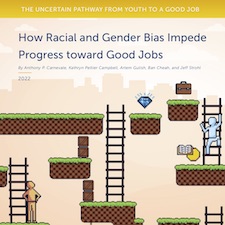 A new report from the Georgetown University Center on Education and the Workforce, funded by a grant from JP Morgan Chase, finds that over the past several decades, the pathway to a good job has become longer and more challenging for young adults to navigate. Today, most young workers do not attain a good job until their early 30s, and only young workers with a bachelor’s degree or higher are consistently more likely than those in the previous generation to have a good job before age 30. Further, the disparities in good jobs by race and gender persist.
A new report from the Georgetown University Center on Education and the Workforce, funded by a grant from JP Morgan Chase, finds that over the past several decades, the pathway to a good job has become longer and more challenging for young adults to navigate. Today, most young workers do not attain a good job until their early 30s, and only young workers with a bachelor’s degree or higher are consistently more likely than those in the previous generation to have a good job before age 30. Further, the disparities in good jobs by race and gender persist.
According to the report, a good job pays at least $35,000 per year, with adjustments based on cost-of-living differences among states.
Among older millennials in the labor force, 80 percent of those with a bachelor’s degree or higher had a good job at age 35, compared with 56 percent of those with some college or an associate’s degree, 42 percent of those with only a high school diploma, and 26 percent of those with less than a high school diploma.
There are stark racial differences by race and gender. It takes Black/African American workers until their mid-30s to have roughly the same chances of having a good job as White workers have by their mid-20s. For young adults in the labor force who were born from 1981 to 1985, 62 percent of White men had a good job, compared to 39 percent of Black men. Even though Black women have achieved far better gains in educational attainment than Black men, only 35 percent of Black women had obtained a good job.
The survey also found that White men ages 25 to 35 with at least a bachelor’s degree had accumulated a net worth of $36,000. Young Black men with at least a bachelor’s degree had a net worth of $2,100. Young Black women with a college degree had a net worth of $900.
Black women are most likely to take out student loans and hold the most student loan debt among major race/ethnicity and gender groups, which contributes to tremendous racial wealth gaps. The median net worth of young White men with no more than a high school diploma is more than 2.5 times that of young Black women with a bachelor’s degree or higher.











